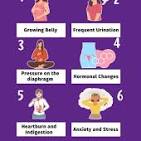The Impact of Acute Insomnia on Your Health and Well-Being
Acute insomnia is a common sleep disorder characterized by difficulty falling asleep or staying asleep for a short period of time, usually lasting a few nights to a few weeks. While many people may experience occasional bouts of acute insomnia due to stress, illness, or environmental factors, persistent episodes can have a significant impact on your health and well-being.
Effects of Acute Insomnia
Acute insomnia can lead to various negative consequences, both physically and mentally. Some of the common effects include:
- Daytime Fatigue: The most obvious consequence of acute insomnia is daytime fatigue, which can impair your concentration, memory, and decision-making abilities.
- Mood Disturbances: Lack of quality sleep can contribute to irritability, mood swings, anxiety, and even depression.
- Impaired Performance: Sleep deprivation can affect your performance at work or school, leading to decreased productivity and an increased risk of accidents.
- Health Risks: Chronic insomnia has been linked to an increased risk of developing health conditions such as obesity, diabetes, cardiovascular disease, and weakened immune function.
Tips for Managing Acute Insomnia
If you’re struggling with acute insomnia, there are several strategies you can try to improve your sleep quality:
- Establish a Bedtime Routine: Create a relaxing bedtime routine to signal your body that it’s time to wind down and prepare for sleep.
- Avoid Stimulants: Limit caffeine intake in the afternoon and avoid alcohol and nicotine close to bedtime.
- Create a Sleep-Conducive Environment: Make sure your bedroom is dark, quiet, and at a comfortable temperature for optimal sleep conditions.
- Mindfulness and Relaxation Techniques: Practice relaxation techniques such as deep breathing exercises or meditation to calm your mind before bedtime.
When to Seek Help
If your acute insomnia persists despite trying these self-care strategies or if it starts affecting your daily life significantly, it’s important to seek help from a healthcare professional. They can help identify any underlying causes of your sleep disturbances and recommend appropriate treatments tailored to your needs.
Remember that prioritizing good sleep hygiene is essential for maintaining overall health and well-being. By addressing acute insomnia early on with proper management techniques, you can improve the quality of your sleep and enhance your overall quality of life.
Understanding Acute Insomnia: Causes, Symptoms, and Solutions
- What is acute insomnia?
- What are the causes of acute insomnia?
- How long does acute insomnia typically last?
- What are the symptoms of acute insomnia?
- How is acute insomnia diagnosed?
- What are the potential complications of untreated acute insomnia?
- What lifestyle changes can help manage acute insomnia?
- When should I seek medical help for acute insomnia?
- Are there any effective treatments for acute insomnia?
What is acute insomnia?
Acute insomnia is a temporary sleep disorder characterized by difficulty falling asleep or staying asleep for a short period of time, typically lasting from a few nights to a few weeks. It is often triggered by stress, illness, environmental changes, or other situational factors. Individuals experiencing acute insomnia may find themselves tossing and turning in bed, feeling restless, and struggling to get the restorative sleep they need. While acute insomnia is usually short-lived and resolves on its own once the underlying cause is addressed, persistent episodes can have negative effects on one’s physical and mental well-being if left untreated.
What are the causes of acute insomnia?
Acute insomnia can be triggered by various factors, including stress, significant life changes, environmental disruptions, illness, or even certain medications. Stressful events such as work deadlines, relationship issues, or financial worries can lead to heightened arousal and difficulty in falling asleep. Changes in routine or environment, like traveling to different time zones or sleeping in a new place, can also disrupt the body’s natural sleep-wake cycle. Additionally, underlying medical conditions such as asthma, allergies, or gastrointestinal problems may contribute to the development of acute insomnia. Identifying and addressing these potential causes is crucial in effectively managing and overcoming acute insomnia episodes.
How long does acute insomnia typically last?
Acute insomnia typically lasts for a short period of time, ranging from a few nights to a few weeks. The duration of acute insomnia can vary depending on the underlying causes, such as stress, illness, or environmental factors. While it is common for individuals to experience occasional bouts of acute insomnia, persistent episodes may require attention and intervention to prevent long-term sleep disturbances and associated health consequences. If acute insomnia persists beyond a few weeks or begins to significantly impact daily functioning, seeking guidance from a healthcare professional is recommended to address the root causes and explore appropriate treatment options.
What are the symptoms of acute insomnia?
Acute insomnia is characterized by difficulty falling asleep or staying asleep for a short period of time, typically lasting a few nights to a few weeks. Common symptoms of acute insomnia include trouble initiating sleep, waking up frequently during the night, feeling fatigued or irritable during the day, experiencing difficulties concentrating or remembering things, and having an overall sense of unrest and dissatisfaction with sleep quality. It’s important to recognize these symptoms early on and address them promptly to prevent acute insomnia from developing into a chronic condition that can significantly impact your health and well-being.
How is acute insomnia diagnosed?
Acute insomnia is typically diagnosed based on a thorough evaluation of the individual’s sleep patterns, habits, and overall health. Healthcare providers may conduct a comprehensive assessment that includes a review of the patient’s medical history, sleep diary, and any underlying factors that could be contributing to their sleep disturbances. Additionally, they may inquire about the duration and severity of the insomnia symptoms to determine if it meets the criteria for acute insomnia. In some cases, further evaluation through sleep studies or specialized assessments may be recommended to rule out other sleep disorders or medical conditions that could be causing the insomnia. A collaborative approach between the patient and healthcare provider is crucial in accurately diagnosing acute insomnia and developing an effective treatment plan tailored to the individual’s needs.
What are the potential complications of untreated acute insomnia?
Untreated acute insomnia can lead to a range of potential complications that can significantly impact an individual’s health and well-being. Prolonged sleep disturbances may exacerbate daytime fatigue, impair cognitive function, and contribute to mood disorders such as irritability, anxiety, and depression. Additionally, untreated acute insomnia can weaken the immune system, increasing susceptibility to illnesses and infections. Chronic sleep deprivation has also been linked to an elevated risk of developing serious health conditions such as cardiovascular disease, obesity, and diabetes. Seeking timely intervention and implementing effective management strategies for acute insomnia are crucial in preventing these potential complications and promoting overall health.
What lifestyle changes can help manage acute insomnia?
Making lifestyle changes can be instrumental in managing acute insomnia. Simple adjustments to daily habits can have a significant impact on improving sleep quality. Establishing a consistent bedtime routine, avoiding stimulants like caffeine and alcohol close to bedtime, creating a peaceful sleep environment, practicing relaxation techniques such as deep breathing or meditation, and engaging in regular exercise can all contribute to better sleep patterns. By incorporating these lifestyle changes into your daily routine, you can effectively manage acute insomnia and promote restful and rejuvenating sleep.
When should I seek medical help for acute insomnia?
If you are experiencing acute insomnia and wondering when to seek medical help, it is advisable to consult a healthcare professional if your sleep disturbances persist for more than a few weeks or significantly impact your daily life. Persistent acute insomnia may indicate underlying health issues or psychological factors that require attention. Additionally, if self-care strategies and lifestyle modifications have not improved your sleep quality, seeking medical help can help identify the root cause of your insomnia and guide you towards appropriate treatment options tailored to your specific needs. Remember, addressing acute insomnia early on with professional guidance can lead to better sleep outcomes and overall well-being.
Are there any effective treatments for acute insomnia?
There are several effective treatments available for acute insomnia. In many cases, addressing the underlying cause of the sleep disturbance can help alleviate symptoms. Cognitive-behavioral therapy for insomnia (CBT-I) is a commonly recommended treatment that focuses on changing behaviors and thought patterns that contribute to sleep difficulties. Additionally, relaxation techniques, improving sleep hygiene, and establishing a consistent bedtime routine can also be beneficial in managing acute insomnia. In some cases, healthcare providers may recommend short-term use of sleep aids or medications to help regulate sleep patterns. It’s important to consult with a healthcare professional to determine the most appropriate treatment plan based on individual needs and circumstances.



